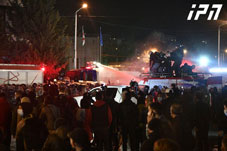
NGOs assess events of November 8 rally, call on the state, and opposition to dialogue
By Khatia Bzhalava
Tuesday, November 10
On November 8, opposition parties and their supporters gathered in front of the parliament of Georgia to protest the ‘illegitimate’ results of Georgia’s 2020 parliamentary elections. Later, activists marched to the Central Election Commission building, where the police fired water cannons to disperse the crowd. It was later reported that the police had also used tear gas, however, the Ministry of Internal Affairs has denied the information. Concerning the rallies, Public Defender Nino Lomjaria as well as Georgian NGOs, believe that the force used by the police was disproportional, and released statements.
International Society for Fair Elections and Democracy (ISFED) expresses “extreme indignation about the use of disproportionate force by the state against protesters during the rally at CEC.” The statement published by ISFED reads that the police used excessive force while trying to disperse the protest. According to the organization, the protest was in the early phase, when the police used water cannons, therefore “considering that the rally did not go beyond the form of peaceful expression, there was no ground for the use of force.”
Another non-governmental organization Democracy Index also stresses in its statement that there was no ground to disperse the rally and the force used against the civilians was disproportionate. The organization notes that the state has failed to keep a proper balance between the obligation to ensure the freedom to assemble and the goal of establishing public order, thus unlawfully restricted expression of protest.
Transparency International has made a statement, which reads that law enforcement units used, without proper grounds or warning, water cannons against a protest rally at the CEC building, in which a small number of people were taking part. TI states that according to the law, before using the force of special means, people must be warned and provided with a reasonable amount of time to comply with the state’s lawful demand. according to TI, “police actions can be described as a gross violation of the constitutional right of assembly.”
ISFED and Transparency International Georgia (TI), together with the Georgian Young Lawyers’ Association (GYLA) have shared another statement, where the organizations call on both the ruling party and the opposition parties to find a way out of the situation through dialogues.
According to the joint statement, the election day was marked by numerous incidents, including attacks on journalists and representatives of monitoring organizations, voter bribing, and confrontation outside the polling station. "Even though the 2020 parliamentary elections were a clear setback for Georgia and the worst elections held under the Georgian Dream government,” the organizations believe that the crisis can be resolved via talks between the ruling and opposition parties.
The Public Defender calls on the state and opposition parties to promptly start negotiations as well. According to the ombudsman, it is important to conduct talks with the participation of every electoral subject to agree on a legal and political solution.
“It is necessary to find ways to recount the results of contentious polling stations with maximum transparency and to ensure fair conduct of the second round,” reads the Public Defender’s statement.
Protests have been ongoing in Georgia since the Parliamentary elections, which the opposition parties believe were rigged. On November 8, opposition party leaders, who had gathered in front of the parliament of Georgia, addressed the government with three demands: Holding free and fair repeat elections; resignation of the chairperson of CEC Tamar Zhvania, and the formation of the commission in a fair manner; release of political prisoners. The demands were voiced by one of the leaders of party European Georgia Elene Khoshtaria, who gave Bidzina Ivanishvili time until 22:00 to “come out and talk to people about these issues with our partners.”
After the expiration of time set by the opposition, protesters marched to the CEC building, where the police used water cannons to disperse them, in response to which activists started throwing stones at the police. Eventually, the rally came to an end as UNM member Nika Melia called on the crowd to leave the area and gather again the next day. Opposition parties state that they will not stop until their demands are met.
At a news briefing, Executive Secretary of Georgian Dream party Irakli Kobakhidze stated that a group with the leadership of Melia tried to storm the CEC building. According to First Deputy Minister of Internal Affairs Kakha Sabanadze, protesters gathered in front of the CEC building violently took down police steel cordons, threw blunt objects, attempted to break into the CEC building, and ignored instructions of the police. “MIA, within the frames of its powers defined by law, used a special tool -water cannon, due to urgent necessity.”
According to Sabanidze, 14 law enforcers, three media representatives, and about 10 protesters received injuries at the rally. He also noted that the police detained 19 individuals “under the Code of Administrative Offences for violating public order and disobedience to the rightful order of Police.” The Central Criminal Police Department of MIA has launched an investigation into the fact of organization and participation in gang violence in the vicinity of the CEC administrative building, crime envisaged under Article 225, Part I and II of the Criminal Code of Georgia.


